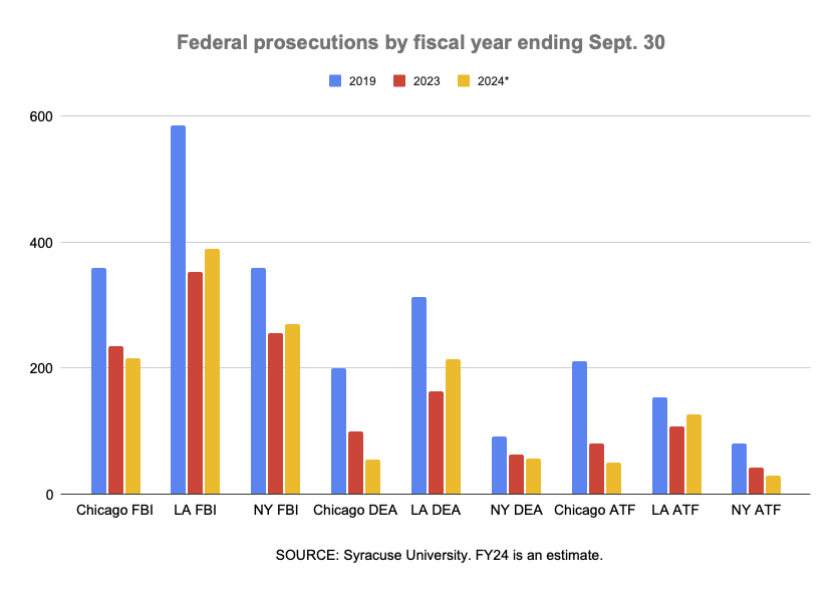Chicago and other big cities have seen the number of new federal prosecutions drop steadily in recent years, likely because of a hangover from the partial shutdown of the government during the COVID-19 pandemic, according to data provided by a Syracuse University research group.
In the current fiscal year ending Sept. 30, Chicago is expected to have a more than 37% decrease in prosecutions of cases from the Bureau of Alcohol, Tobacco, Firearms and Explosives compared with fiscal year 2023.
A 45% drop in prosecutions of cases from the Drug Enforcement Administration is expected — along with an 8% fall in prosecutions of cases investigated by the FBI, according to Syracuse University’s Transactional Records Access Clearinghouse. The TRAC program obtains federal court data through the Freedom of Information Act.
It’s unclear, though, if that slowdown has affected crime in Chicago. As new federal prosecutions have fallen here since the start of the pandemic, reports of crime surged but are now ebbing somewhat.
This year, through June 16, reported crime in the city was down 11% compared with the same period in 2023, and the number of killings was down 15%, but there was a rise in reported burglaries, robberies and aggravated battery, according to the Chicago Police Department. Meantime, the annual number of arrests by Chicago cops has trended upward since the pandemic.
Starting in early 2020, new federal prosecutions began to drop in the Northern District of Illinois, which includes Chicago, as well as in the Eastern District of New York, which includes Brooklyn, Queens and Long Island, and in the Central District of California, which includes Los Angeles.
“We do know that the COVID-19 pandemic and the resulting partial shutdown of the federal government beginning in March 2020 disrupted federal investigations and prosecution activity, significantly impacting enforcement activities by the Drug Enforcement Administration,” TRAC said in May in a report focusing on the DEA.
TRAC anticipates New York will continue to have decreases in federal prosecutions of ATF and DEA cases this fiscal year, but FBI cases will rise. Los Angeles is expected to see increases in new prosecutions of cases by all three agencies this fiscal year after years of declines.
Less urban federal districts in states such as Oklahoma, South Dakota and West Virginia are among those with the highest numbers of prosecutions of ATF, FBI and DEA cases per 1,000 people.

Chicago and other major cities saw new federal prosecutions of ATF, DEA and FBI cases fall in early 2020 after the partial shutdown of the government because of COVID-19. This fiscal year, Chicago is expected to continue to see decreases in new prosecutions of cases by those agencies.
Frank Main | Chicago Sun-Times
In Chicago, there were about 300 new federal prosecutions of DEA cases per year in the mid-2000s. In fiscal year 2019, there were about 200 such cases in Chicago, and in fiscal year 2023, about 100, according to TRAC.
Nationally, DEA referred 17,240 cases to prosecutors in fiscal year 2019 compared with only 12,545 in 2023. And the average length of time between DEA referring a case to prosecutors and a determination of guilt or innocence for the defendant went from 635 days to 975 days.
“It now requires many more days after referrals arrive at federal prosecutor offices for cases to be filed and court proceedings to be concluded through conviction and sentencing,” TRAC said in its May report. “Increased processing times were seen in most U.S. attorney offices.”
A spokesman for the U.S. attorney’s office in Chicago declined to comment on the TRAC figures.





